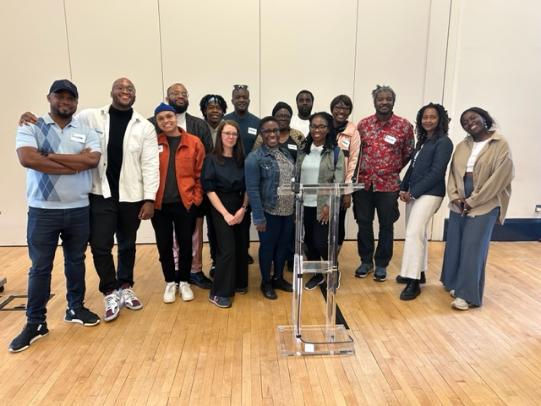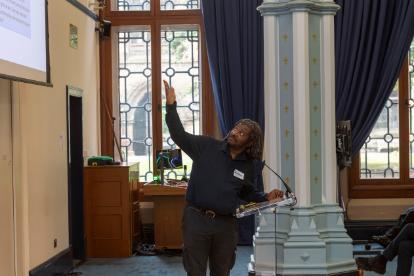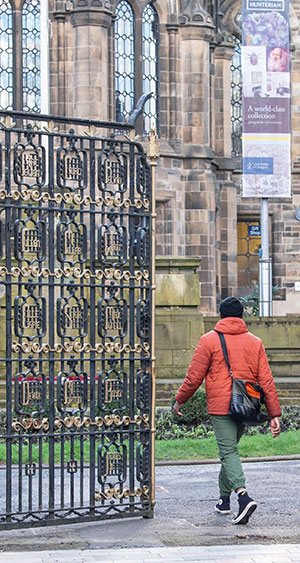College News
Published: 29 August 2023
Organising the James McCune Smith Inaugural Conference 2023
A Reflection by Steveen Ulysse
Discover the journey of organising the inaugural James McCune Smith Conference 2023 through the eyes of Steveen Ulysse. Read about the challenges, triumphs and insights gained from this ground-breaking conference that highlights the contributions of Black scholars in British Higher Education. Steveens's reflections provide a unique perspective on orchestrating an event that resonates with the essence of James McCune Smith's legacy.
Organising the inaugural James McCune Smith conference (find out more by following this link) - especially one that surfaces themes close to you - is a rewarding feat. But by no means an easy one.
I remember the call made to the inaugural cohort of James McCune Smith scholars (of which I am a member) for volunteers to organise the very first JMS conference. Looking back, I can attest to having no idea of the level of work, and commitment such an endeavour would entail, particularly being the first of its kind not just in Glasgow, but in the United Kingdom. I and five others answered the call, excited by the prospect of having our collective ideas stamped on the proceedings, but not really knowing what we were letting ourselves in for!

The cohort of James McCune Smith scholars, with Heather Lamby (CoSE Graduate School Manager)
The student-led conference organising team comprised of myself, Amina Lawal Agoro, Meshach Lee, Russell Smith, and Prudence Mlophe, with invaluable support from the Science and Engineering Graduate School and PGR Intern Olubunmi Onanuga.
The challenges of balancing the pressures of a full-time PhD programme alongside the demands of conference organising cannot be underplayed. The underlying operating structures of the conference adapted to take this into account, and teamwork and division of labour went a long way. I know my fellow co-organisers would echo my sentiments in saying that the experience was a colourful, thought-provoking and unforgettable one, which has enriched our university experience. Being witness to the fruit of our collective effort, the positive public reception to the event, and developing a nuanced understanding of its implications for the future, has been transformational.
Tips For Organising Your Own Conference
If you harbour ambitions of organising a conference of your own, here are my ’field notes’ which you may find useful. These reflect my personal experience and are by no means exhaustive.
1. Choosing speakers
Of course, there cannot be a conference without speakers, and for the James McCune Smith Conference, in conjunction with the University of Glasgow’s decolonisation programme, it was imperative that chosen speakers reflected the ideals behind the conference. The conference focused on highlighting the role, as well as the contribution, of Black scholars to British Higher Education. Each speaker was carefully curated through a series of poll votes, and investigative measures by the conference organising team, and the JMS scholars as a unit. This careful consideration birthed a strong and diverse panel of distinguished and renowned scholars, ranging from Sir. Geoff Palmer, Scotland’s first Black professor and Dr. Ruby Zelzer whom I have dubbed the queen of statistics, for her unique ability to humanise data, just to name the two. Overall, it was not only important to have excellent speakers, but it was crucial to have speakers who shared the vision of what the conference can be in the years to come.
2. The role of teamwork
We often hear the saying “teamwork makes the dream work” and this could not be truer in organising a conference. It was interesting to see how easy it was to find people to form the organising team, we went against the traditional aspect of voting people into various positions, instead members of the organising team naturally gravitated towards the roles they enjoyed, and through this genuine affinity, we were able to pull our collective resources and experiences together to deliver a successful conference.
3. Making Use of Administrative Support
Whilst this might seem fairly obvious for those who have conference organising experience, I was not fully prepared for the leviathan role admin would play in organising this conference. From creating an email account, where the organising team could have access to the shared inbox, to various minute items which were so many that we truly can spend days listing them. Without strong administrative support from the JMS professional services team, this conference would not have been as successful as it was.
4. Advertising Is Crucial
To quote Herbert McLuhan “the medium is the message,” even more so in organising a conference. The James McCune Smith Scholarship programme is new, so even before starting to organise the conference, we knew that advertising would have to be robust, to maximise the impact and vision we had for the conference. To achieve this goal, we relied heavily on social media, particularly twitter, where we launched a high-profile advertising campaign, sharing information about our speakers, to highlight what was to come. Of course, we cannot overlook the amazing support we received from the University’s social media team; special thanks to Tasha Quinn and Elly White, through their wonderfully filmed videos we were able to capture the imagination of our audience even before our conference. Without this advertising strategy which also included the use of banners, flyers, and posters, it is difficult to say that our impact would have been the same.
5. A Note On Time
“Time is money,” “time is of the essence,” these sayings have proven themselves to be true, once again. It always seemed like there was not enough time to get things done for the conference. Whether if it was attending our weekly meetings, or the other meetings which always manage to crop up for one reason or another. At times, it felt like we were forgetting something, or someone was taking too long to respond, even when they were not, it seemed like deadlines loomed everywhere we looked. However, in the end, time became our friend, and moved quickly allowing us to see the end product – the first James McCune Smith Conference.
6. Structuring the Conference
From the start of the planning process, we knew we wanted to have the conference over a two-day period. The first day would follow that of a traditional conference, where speakers would present their ideas, and the second day would follow the unconference format, where speakers would have the freedom to share their ideas however, they saw fit. This was deliberate, as some of the projects presented form part of larger debates around Black culture, ecology, epistemology, and religion.
A Final Reflection
In closing, this was a fantastic experience, being able to trace the footsteps of James McCune Smith by being part of this worthwhile conference comprising some of the UK’s brightest minds and highlighting their contribution to Higher Education as Black academics. Connecting the dots, between their work/presence and what that means for emerging scholars such as myself, was a eureka moment. As a collective, we the JMS Scholars are excited to be part of this growing conversation around Black scholars in Higher Education which is happening at the University of Glasgow.

First published: 29 August 2023
<< News


